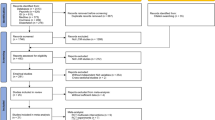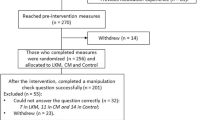Abstract
The Four Immeasurables Meditations (FIM) are a group of meditations rooted in Buddhism that cultivate pro-social attitudes. Previous studies have reported common difficulties during the practice of the FIM, yet there is no specific measure for those difficulties. The current study intended to develop the Difficulties during Meditation involving Immeasurable Attitudes Scale (DMIAS) to measure two aspects of common difficulties during the FIM practice: lack of concentration (LOC) and lack of pro-social attitudes (LOP). A total of 506 meditation novices were used in four studies. In study 1, exploratory factor analysis (EFA) with the data from a one-time practice of loving-kindness meditation was used to produce the 12-item DMIAS with two independent factors that were positively correlated (LOC and LOP). Studies 2, 3, and 4 validated the DMIAS in one-time practices of loving-kindness meditation, appreciative joy meditation, and compassion meditation, respectively. Across studies 2 to 4, confirmatory factor analyses supported the two-factor structure of the DMIAS, and both LOP and LOC had negative correlations with the other-focused positive emotions generated by the meditations. Although manipulations of the target to be blessed (study 3) and the length of practice (study 4) only had small impacts on the effects of meditation, the pattern of correlations between emotional outcomes and certain factors of the DMIAS was significantly different between the manipulated conditions. In summary, the DMIAS is a useful tool in understanding the difficulties during the FIM practice, and the current study also illustrated how technical details of the FIM influences the effects of the FIM practice.
Similar content being viewed by others
References
Barnhofer, T., Chittka, T., Nightingale, H., Visser, C., & Crane, C. (2010). State effects of two forms of meditation on prefrontal EEG asymmetry in previously depressed individuals. Mindfulness, 1(1), 21–27.
Bentler, P. M. (1990). Comparative fit indexes in structural models. Psychological Bulletin, 107(2), 238–246.
Boellinghaus, I., Jones, F. W., & Hutton, J. (2013). Cultivating self-care and compassion in psychological therapists in training: the experience of practicing loving-kindness meditation. Training and Education in Professional Psychology, 7(4), 267–277.
Bryant, F. B., & Yarnold, P. R. (1995). Principal components analysis and exploratory and confirmatory factor analysis. In L. G. Grimm & R. R. Yarnold (Eds.), Reading and understanding multivariale statistics (pp. 99–136). Washington, DC: American Psychological Association.
Crane, C., Jandric, D., Barnhofer, T., & Williams, J. M. G. (2010). Dispositional mindfulness, meditation, and conditional goal setting. Mindfulness, 1(4), 204–214.
Comrey, A. L., & Lee, H. B. (1992). A first course in factor analysis (2nd ed.). Hillsdale: Lawrence Erlbaum Associates.
Eid, M., Gollwitzer, M., & Schmitt, M. (2011). Statistik und Forschungsmethoden Lehrbuch. Beltz: Weinheim.
Fredrickson, B. L., Tugade, M. M., Waugh, C. E., & Larkin, G. R. (2003). What good are positive emotions in crisis? A prospective study of resilience and emotions following the terrorist attacks on the United States on September 11th, 2001. Journal of Personality and Social Psychology, 84(2), 365-376
Frewen, P., Hargraves, H., DePierro, J., D’Andrea, W., & Flodrowski, L. (2016). Meditation Breath Attention Scores (MBAS): development and investigation of an internet-based assessment of focused attention during meditation practice. Psychological Assessment, 28(7), 830–840.
Galante, J., Bekkers, M. J., Mitchell, C., & Gallacher, J. (2016). Loving-kindness meditation effects on well-being and altruism: a mixed-methods online RCT. Applied Psychology: Health and Well-Being, 8(3), 322–350.
Galante, J., Galante, I., Bekkers, M. J., & Gallacher, J. (2014). Effect of kindness-based meditation on health and well-being: a systematic review and meta-analysis. Journal of Consulting and Clinical Psychology, 82(6), 1101–1114.
Hu, L., & Bentler, P. M. (1999). Cutoff criteria for fit indexes in covariance structure analysis: conventional criteria versus new alternatives. Structural Equation Modeling, 6(1), 1–55.
Hutcherson, C. A., Seppala, E. M., & Gross, J. J. (2015). The neural correlates of social connection. Cognitive, Affective, & Behavioral Neuroscience, 15(1), 1–14.
Johnson, D. P., Penn, D. L., Fredrickson, B. L., Kring, A. M., Meyer, P. S., Catalino, L. I., et al. (2011). A pilot study of loving-kindness meditation for the negative symptoms of schizophrenia. Schizophrenia Research, 129(2), 137–140.
Kearney, D. J., McManus, C., Malte, C. A., Martinez, M. E., Felleman, B., & Simpson, T. L. (2014). Loving-kindness meditation and the broaden-and-build theory of positive emotions among veterans with posttraumatic stress disorder. Medical Care, 52, S32–S38.
Lee, T. M., Leung, M. K., Hou, W. K., Tang, J. C., Yin, J., So, K. F., et al. (2012). Distinct neural activity associated with focused-attention meditation and loving-kindness meditation. PLoS One, 7(8), e40054.
Lee, Y. C., Lin, Y. C., Huang, C. L., & Fredrickson, B. L. (2013). The construct and measurement of peace of mind. Journal of Happiness Studies, 14(2), 571–590.
Lau, M. A., Bishop, S. R., Segal, Z. V., Buis, T., Anderson, N. D., Carlson, L., et al. (2006). The Toronto mindfulness scale: development and validation. Journal of Clinical Psychology, 62(12), 1445–1467.
Little, T. D., Cunningham, W. A., Shahar, G., & Widaman, K. F. (2002). To parcel or not to parcel: exploring the question, weighing the merits. Structural Equation Modeling, 9(2), 151–173.
Lumma, A. L., Kok, B. E., & Singer, T. (2015). Is meditation always relaxing? Investigating heart rate, heart rate variability, experienced effort and likeability during training of three types of meditation. International Journal of Psychophysiology, 97(1), 38–45.
Parks, S., Birtel, M. D., & Crisp, R. J. (2014). Evidence that a brief meditation exercise can reduce prejudice toward homeless people. Social Psychology, 24, 458–465.
Royzman, E. B., & Rozin, P. (2006). Limits of symhedonia: the differential role of prior emotional attachment in sympathy and sympathetic joy. Emotion, 6(1), 82–93.
Russ, S. L., Maruyama, G., Sease, T. B., & Jellema, S. (2017). Do early experiences matter? Development of an early meditation hindrances scale linked to novice meditators’ intention to persist. Psychology of Consciousness: Theory, Research, and Practice, 4(3), 274–287.
Sears, S. R., Kraus, S., Carlough, K., & Treat, E. (2011). Perceived benefits and doubts of participants in a weekly meditation study. Mindfulness, 2(3), 167-174.
Singh, N. N., Lancioni, G. E., Medvedev, O. N., Myers, R. E., Chan, J., McPherson, C. L., Jackman, M. M., & Kim, E. (2018). Comparative effectiveness of caregiver training in mindfulness-based positive behavior support (MBPBS) and positive behavior support (PBS) in a randomized controlled trial. Mindfulness. https://doi.org/10.1007/s12671-018-0895-2.
Shonin, E., Van Gordon, W., Compare, A., Zangeneh, M., & Griffiths, M. D. (2014). Buddhist-derived loving-kindness and compassion meditation for the treatment of psychopathology: a systematic review. Mindfulness, 6(5), 1161–1180.
Sujiva, V. (2007). Loving-kindness meditation. Available from http://enlight.lib.ntu.edu.tw/FULLTEXT/JR-MAG/mag140106.pdf.
Tavakol, M., & Dennick, R. (2011). Making sense of Cronbach’s alpha. International Journal of Medical Education, 2, 53–55.
Yong, A. G., & Pearce, S. (2013). A beginner’s guide to factor analysis: focusing on exploratory factor analysis. Tutorials in Quantitative Methods for Psychology, 9(2), 79–94.
Zeng, X., Chan, V. Y., Liu, X., Oei, T. P., & Leung, F. Y. (2017a). The Four Immeasurables Meditations: differential effects of appreciative joy and compassion meditations on emotions. Mindfulness, 8(4), 949–959.
Zeng, X., Chan, V. Y., Oei, T. P., Leung, F. Y., & Liu, X. (2017b). Appreciative joy in Buddhism and positive empathy in psychology: how do they differ? Mindfulness, 8(5), 1184–1194.
Zeng, X., Chio, F. H., Oei, T. P., Leung, F. Y., & Liu, X. (2017c). A systematic review of associations between amount of meditation practice and outcomes in interventions using the Four Immeasurables Meditations. Frontiers in Psychology, 8, 141. https://doi.org/10.3389/fpsyg.2017.00141.
Zeng, X., Chiu, C., Wang, R., Oei, T., & Leung, F. (2015). The effect of loving-kindness meditation on positive emotions: a meta-analytic review. Frontiers in Psychology, 6, 1693. https://doi.org/10.3389/fpsyg.2015.01693.
Zeng, X., Liao, R., Zhang, R., Oei, T. P., Yao, Z., Leung, F. Y., & Liu, X. (2017d). Development of the appreciative joy scale. Mindfulness, 8(2), 286–299.
Zeng, X., Wang, R., Oei, T. P., & Leung, F. Y. (2018). Heart of joy: a randomized controlled trail evaluating the effect of an Appreciative Joy Meditation training on subjective well-being and attitudes. Mindfulness. https://doi.org/10.1007/s12671-018-0992-2.
Acknowledgments
Dr. Oei is now an Emeritus Professor of University of Queensland, Visiting Professor (part time) at James Cook University, Singapore and Guest Professor of Department of Psychology, Nanjing University, China. We would like to thank Jing LV, NienChin LIN, Yan GAO, and other anonymous Buddhist experts for evaluating the items.
Funding
This study was supported by the National Natural Science Foundation of China (Grant No. 71702108).
Author information
Authors and Affiliations
Contributions
XZ and LF designed the study, XZ and VC collected and analyzed data, XZ, RW, and OT wrote the article, and all authors discussed the findings.
Corresponding author
Ethics declarations
Ethical Approval
All procedures performed in studies involving human participants were in accordance with the ethical standards of the institutional and/or national research committee and with the 1964 Helsinki declaration and its later amendments or comparable ethical standards. The procedures were approved by Survey and Behavioural Research Ethics Committee in the Chinese University of Hong Kong. Informed consent was obtained from all individual participants included in the study.
Conflict of Interest
The authors declare that they have no conflict of interest.
Electronic Supplementary Material
ESM 1
(DOCX 121 kb)
Rights and permissions
About this article
Cite this article
Zeng, X., Wang, R., Chan, V.Y.L. et al. The Development of the Difficulties During Meditation Involving Immeasurable Attitudes Scale. Mindfulness 10, 812–823 (2019). https://doi.org/10.1007/s12671-018-1051-8
Published:
Issue Date:
DOI: https://doi.org/10.1007/s12671-018-1051-8




